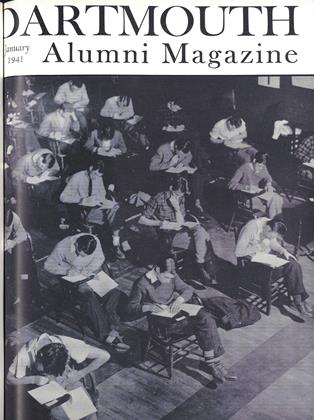SOMETIMES THE QUESTION is asked of Dartmouth men: "Who are your most renowned alumni?" If the reply does not name off a long list of men who have achieved high and the highest distinction in their fields it is not because of lack of material. There are few, even on the staff in Hanover, who have thorough knowledge of the deep resources of talent and achievement that are in the alumni body.
The list of honor would be a long one. On the Alumni Records Office data we must now place the inevitable asterisk before the name of Raymond Pearl '99, whose fame is widely recognized.
He was professor of biology at Johns Hopkins from 1918 until his untimely and unexpected death November 17. He had long been recognized internationally as one of the foremost authorities on population. He was renowned as a statistician of the human race. Much of his life work was directed toward a productive search for answers to the question: "Why do some people live longer than others?" According to the New York Times: "He never professed to have found a definite answer, but his poring over the medical record of thousands of persons led him to believe that 'the duration of life in general varies inversely with the rate of living.' The heart that beats at a rapid rate for the first forty years of its existence, he believed, could not compete with that which beats only at the average pace. Thus the biologist-philosopher preached moderation."
Dr. Pearl had been given numerous honorary degrees—the Doctorates o£ Science, of Laws, and of Literature. The scope of these accolades—Science, Laws, Literature—truly reveals the breadth of talent and range of achievement that were his. We pay tribute in this issue to one of the most notable careers in science of sons of Dartmouth of all time.
 View Full Issue
View Full Issue
More From This Issue
-
 Article
ArticleHarry Hillman, Sportsman
January 1941 By FRANCIS E. MERRILL '26 -
 Article
ArticleThat Men May Understand
January 1941 By HAROLD ORDWAY RUGG '08 -
 Class Notes
Class Notes1918*
January 1941 By ERNEST H. EARLEY, DONALD L. BARR -
 Article
ArticleALUMNI TRY THEIR WINGS
January 1941 By Everett Wood '38 -
 Article
ArticleThe Undergraduate Chair
January 1941 By Charles Bolté '41 -
 Class Notes
Class Notes1921*
January 1941 By CHARLES A. STICKNEY JR, ROGER C. WILDE
The Editor.
-
 Article
ArticleNot Too Late
December 1940 By The Editor. -
 Article
ArticleNot Convicted
January 1941 By The Editor. -
 Article
ArticleTolerance
January 1941 By The Editor. -
 Article
ArticleHarry Hillman
January 1941 By The Editor. -
 Article
ArticleAmerican Republics
January 1941 By The Editor. -
 Article
ArticleGRADUS AD PARNASSUM
February 1941 By THE EDITOR.







